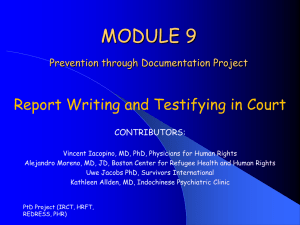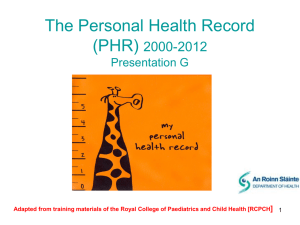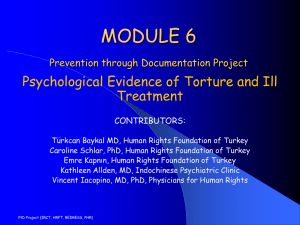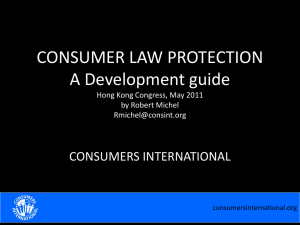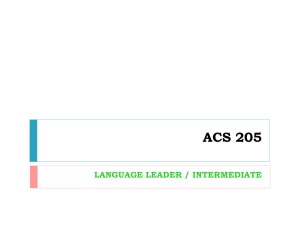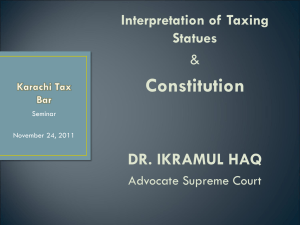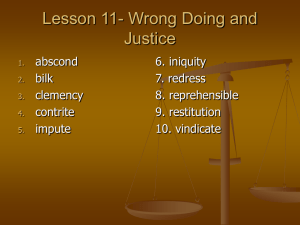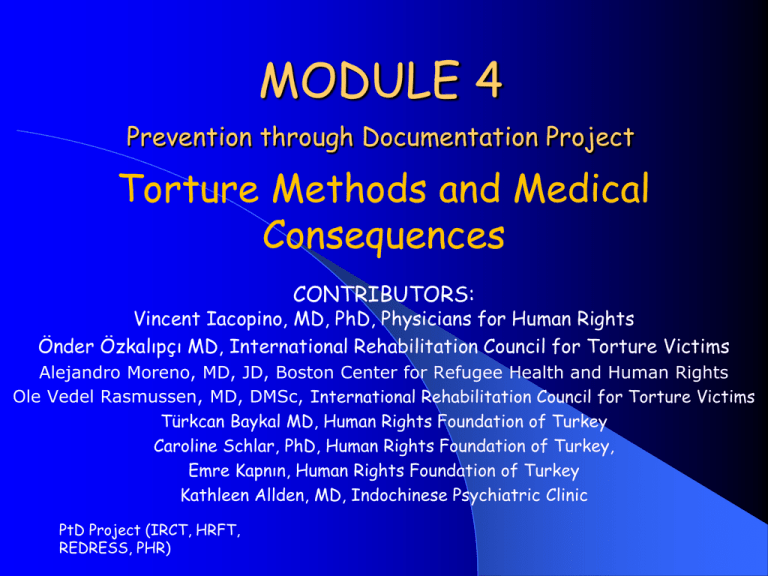
MODULE 4
Prevention through Documentation Project
Torture Methods and Medical
Consequences
CONTRIBUTORS:
Vincent Iacopino, MD, PhD, Physicians for Human Rights
Önder Özkalıpçı MD, International Rehabilitation Council for Torture Victims
Alejandro Moreno, MD, JD, Boston Center for Refugee Health and Human Rights
Ole Vedel Rasmussen, MD, DMSc, International Rehabilitation Council for Torture Victims
Türkcan Baykal MD, Human Rights Foundation of Turkey
Caroline Schlar, PhD, Human Rights Foundation of Turkey,
Emre Kapnın, Human Rights Foundation of Turkey
Kathleen Allden, MD, Indochinese Psychiatric Clinic
PtD Project (IRCT, HRFT,
REDRESS, PHR)
Module 4 Outline
Subjective
Torture
element of suffering
methods
Psychological
torture
PtD Project (IRCT, HRFT, REDRESS, PHR)
consequences of
The Subjective Element of Suffering
Take into consideration individual factors:
– Gender
– Religion
– Physical and psychological condition
– Age
Meaning of experiences affects degree of
suffering
PtD Project (IRCT, HRFT, REDRESS, PHR)
Beating
Most common method of physical torture
Practiced with or without instruments
Impacts may cause
– Abrasions
– Lacerations
– Contusions
– Hematoma
– Internal bleeding
Perpetrators may:
– wait for signs to resolve prior to remanding to
judicial custody
– Attempt to limit evidence using barriers (ie blanket)
PtD Project (IRCT, HRFT, REDRESS, PHR)
PtD Project (IRCT, HRFT, REDRESS, PHR)
PtD Project (IRCT, HRFT, REDRESS, PHR)
Beating
PtD Project (IRCT, HRFT, REDRESS, PHR)
Falanga
PtD Project (IRCT, HRFT, REDRESS, PHR)
Falanga
PtD Project (IRCT, HRFT, REDRESS, PHR)
Ear Trauma
PtD Project (IRCT, HRFT, REDRESS, PHR)
Eye Trauma
PtD Project (IRCT, HRFT, REDRESS, PHR)
Restraint, Shackling and
Positional Torture
Characteristically, these forms of torture leave few
external marks or radiological findings, despite
subsequent chronic disability.
– Handcuffs, wrist or ankle ties leave no mark if applied
properly
The use of leg irons is widespread in police stations
and prisons
Many forms of positional torture, all of which tie or
restrain the victim in contorted, hyperextended or
other unnatural positions
PtD Project (IRCT, HRFT, REDRESS, PHR)
PtD Project (IRCT, HRFT, REDRESS, PHR)
PtD Project (IRCT, HRFT, REDRESS, PHR)
PtD Project (IRCT, HRFT, REDRESS, PHR)
Abu Ghraib
PtD Project (IRCT, HRFT, REDRESS, PHR)
PtD Project (IRCT, HRFT, REDRESS, PHR)
PtD Project (IRCT, HRFT, REDRESS, PHR)
PtD Project (IRCT, HRFT, REDRESS, PHR)
PtD Project (IRCT, HRFT, REDRESS, PHR)
PtD Project (IRCT, HRFT, REDRESS, PHR)
Suspension
Common form of torture
– produces extreme pain
– leaves little visible evidence of injury
Examples:
– Cross suspension or “crusifixion”
– Butchery suspension
– Reverse butchery suspension
– “Palestinian” suspension
– “Parrot perch” suspension
PtD Project (IRCT, HRFT, REDRESS, PHR)
PtD Project (IRCT, HRFT, REDRESS, PHR)
PtD Project (IRCT, HRFT, REDRESS, PHR)
PtD Project (IRCT, HRFT, REDRESS, PHR)
PtD Project (IRCT, HRFT, REDRESS, PHR)
Winged Scapula
PtD Project (IRCT, HRFT, REDRESS, PHR)
PtD Project (IRCT, HRFT, REDRESS, PHR)
Crushing and Stretch Injuries
PtD Project (IRCT, HRFT, REDRESS, PHR)
Crushing and Stretch Injuries
PtD Project (IRCT, HRFT, REDRESS, PHR)
Crushing and Stretch Injuries
PtD Project (IRCT, HRFT, REDRESS, PHR)
Burning
PtD Project (IRCT, HRFT, REDRESS, PHR)
Electrical Injuries
PtD Project (IRCT, HRFT, REDRESS, PHR)
PtD Project (IRCT, HRFT, REDRESS, PHR)
PtD Project (IRCT, HRFT, REDRESS, PHR)
Asphyxiation
PtD Project (IRCT, HRFT, REDRESS, PHR)
PtD Project (IRCT, HRFT, REDRESS, PHR)
Asphyxiation
PtD Project (IRCT, HRFT, REDRESS, PHR)
Asphyxiation
PtD Project (IRCT, HRFT, REDRESS, PHR)
Violent Shaking
Acute symptoms
–
–
–
–
headache
disorientation,
altered mental state
If severe:
cerebral oedema
haematoma
retinal haemorrhage
death
Chronic symptoms of non-fatal brain trauma:
– recurrent headaches
– cognitive impairment
– cervical spine fracture/cord injury/paralysis
PtD Project (IRCT, HRFT, REDRESS, PHR)
Sexual Assault
Nudity
Verbal threats
Humiliating acts
Molestation/groping
Assault
– Injury to genitals
– Forced sexual acts
– Insertion of objects (vagina, urethra, anus)
– Rape: Penis inserted in to vagina, mouth, anus
PtD Project (IRCT, HRFT, REDRESS, PHR)
PtD Project (IRCT, HRFT, REDRESS, PHR)
Sexual Assault
PtD Project (IRCT, HRFT, REDRESS, PHR)
Sexual Assault
PtD Project (IRCT, HRFT, REDRESS, PHR)
Sexual Humiliation – Abu Ghraib
PtD Project (IRCT, HRFT, REDRESS, PHR)
Sexual Humiliation – Abu Ghraib
PtD Project (IRCT, HRFT, REDRESS, PHR)
Sexual Humiliation
PtD Project (IRCT, HRFT, REDRESS, PHR)
Prolonged Isolation and Sensory
Deprivation
PtD Project (IRCT, HRFT, REDRESS, PHR)
Sleep Deprivation
achieved through the use of
– stress positions
– sensory overload
– temperature manipulation
– other techniques
causes cognitive impairments including deficits in memory,
learning, logical reasoning, complex verbal processing, and
decision-making
Symptoms of torture
– independently affects clinical outcome
– Affects course of disorder
– associated with independent increase in of suicidal ideation
and action
PtD Project (IRCT, HRFT, REDRESS, PHR)
Temperature Manipulation
PtD Project (IRCT, HRFT, REDRESS, PHR)
Sensory Bombardment
practiced with exposure to bright lights,
flashing strobe lights and/or loud music for
extended periods of time
– may cause physiologic distress and
disorientation
– Loud music may cause hearing loss or ringing in
the ears; acute or chronic (chronic tinnitus
more common)
PtD Project (IRCT, HRFT, REDRESS, PHR)
Threats of Harm
PtD Project (IRCT, HRFT, REDRESS, PHR)
Threats of Harm
PtD Project (IRCT, HRFT, REDRESS, PHR)
Psychological Consequences of
Torture
Outline:
– Risk factors
– Goals of torture
– The Paradox of psychological
–
–
–
–
consequences
Psychological Consequences
Social, Political and Cultural Context
Risk factors for refugees
Psychological Symptoms
PtD Project (IRCT, HRFT, REDRESS, PHR)
Risk factors for survivors of
torture
Torture
War
Political oppression
Imprisonment
Witnessing or experiencing atrocities
Loss/separation from family
Distortion of social relationships
PtD Project (IRCT, HRFT, REDRESS, PHR)
Goals of Torture
Primary goal : destroy the victim psychologically
(not physically)
Reduce to helplessness (break person’s will)
Damage intimate relationships in families
Damage relationships of victims and communities
Damage coherence of entire communities by
setting horrific examples
PtD Project (IRCT, HRFT, REDRESS, PHR)
First Paradox of
Psychological Consequences
of Torture
Most personal and enduring consequences
Affect the victim, family and community.
Psychological scars are invisible; there are
no objective signs.
PtD Project (IRCT, HRFT, REDRESS, PHR)
Second Paradox of
Psychological Consequences
of Torture
Extreme trauma such as torture does not
always produce psychological problems
Absence of mental problems does not mean
that the individual was not tortured
PtD Project (IRCT, HRFT, REDRESS, PHR)
consequences of torture
TORTURE CAUSES TRAUMA
SOCIETY
FAMILY
INDIVIDUAL
PtD Project (IRCT, HRFT, REDRESS, PHR)
Consequences of Torture
INDIVIDUAL
FAMILY
SOCIETY
PtD Project (IRCT, HRFT, REDRESS, PHR)
can terrorize entire
population
creates an atmosphere
of pervasive threat,
chronic fear, terror,
inhibition, hopelessness
creates repressive
ecology: a state of
generalized insecurity,
lack of confidence and
rupture of social fabric.
can break or damage
will and coherence of
entire communities
Consequences of Torture
INDIVIDUAL
– different forms of
family dysfunction
– disruptions in course of
family development
FAMILY
SOCIETY
PtD Project (IRCT, HRFT, REDRESS, PHR)
Can lead to family
traumas that cause:
Assessing the effects
of torture on survivor’s
family dynamics can be
important in torture
assessment
Consequences of Torture
INDIVIDUAL
On individual
On relationship between
individual and his/her
intimate relationship
On relationship between
individual and society
FAMILY
SOCIETY
PtD Project (IRCT, HRFT, REDRESS, PHR)
Psychological Consequences of Torture
Torture is a complex phenomenon that
can traumatize, damage;
body
personality
cognitive, emotional,
behavioral functioning
dreams, hopes,
aspirations for the future
self actualization
Beliefs
system of meaning about
himself and the world
the autonomy
Sense of being grounded
in a family and society
Attachment
sense of safety and survival
PtD Project (IRCT, HRFT, REDRESS, PHR)
Connectedness
relationships between
spouse,
parents,
children,
community
Psychological Consequences of Torture
There is a complex relationship between
torture and its symptomatology.
The psychological responses to torture are
affected by multiple factors.
PtD Project (IRCT, HRFT, REDRESS, PHR)
SOCIAL CONTEXT
BEFORE, DURING, AFTER
TORTURE
MEANİNG OF TORTURE
BELIEF SYSTEM
PREPAREDNESS
SUPPORT SYSTEM
CONDITIONS OF TORTURE
PSYCHOLOGICAL
RESPONSE
PREVIOUS
TRAUMAS
ADDITIONAL LOSSES
AGE,
DEVELOPMENTAL
PHASE
PRE-EXISTING
PSYCHOLOGICAL
DISORDERS
COPING CAPABILITIES
PHYSICAL HEALTH
PtD Project (IRCT, HRFT, REDRESS, PHR)
Risk Factors for Refugee
Populations
Trauma
Migration
Acculturation
Poverty
Prejudice
Cultural beliefs and traditional roles
PtD Project (IRCT, HRFT, REDRESS, PHR)
Psychological Symptoms
Despite variability, clusters of symptoms
and psychological reactions have been
observed frequently among survivors
– PTSD and Major Depression most common
However:
– One doesn’t have to be tortured to develop
PTSD or Major Depression
– Everyone who has been tortured does not
develop PTSD and Major Depression
PtD Project (IRCT, HRFT, REDRESS, PHR)
Psychological Disorders Associated
with Torture and Severe Trauma
Posttraumatic Stress Disorder
Major Depression
Anxiety Disorders
Substance Abuse
Enduring Personality Change
Somatoform Disorders
Dissociation
Psychosis
PtD Project (IRCT, HRFT, REDRESS, PHR)

